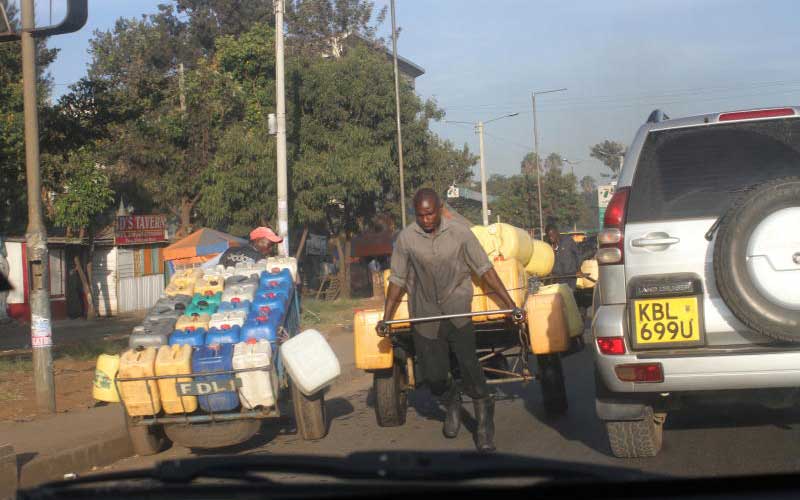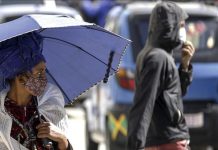AfricaPress-Kenya: As the government advocates hand washing to stem spread of coronavirus, perennial water crisis in the city could frustrate the sanitation campaign.
Washing or sanitising hands regularly, according to epidemiologist Marshal Mweu, will be key in averting a full-blown crisis.However, biting water crisis has remained a challenge across city estates for years.
City residents have had to grapple with this challenge long before they imagined that they would have to deal with the threat posed by the new virus that has left more developed countries reeling in its wake.
Considering the toll that the country’s economy is projected to take in the coming months owing to the virus, the hand sanitisers currently being sold will soon be a luxury to most residents, leaving water as their only option.
Take over
When he took over control of the city, one of the urgent matters Maj-Gen Mohammed Badi was tasked with was ending Nairobi’s perennial water shortage that has previously been blamed on cartels cashing in on the crisis.
This task is particularly critical at the moment as the country’s success in keeping the global pandemic at bay heavily depends on availability of water.Most households in Nairobi’s Eastlands experience some form of water scarcity.
Umoja Estate, for instance, is a lesson in contradiction. The vast estate is occupied mostly by low and middle-class citizens, and this disparity shows in the distribution of water. Some residents of Umoja have unlimited access to the resource while others enjoy partial access. Others, however, are not as lucky and their taps can be dry for months on end.Mama Njeri says she has lived in Umoja 2 for close to two decades, moving houses in search of a reliable water supply.
“Before I moved to my new house, I had never seen water come out of my taps for four years,” she says.She since moved to a different place, still within Umoja 2, she now has access to water all day courtesy of a borehole sunk by the owner of a neighbouring flat. She, however, only uses the water for her domestic needs, opting to buy drinking water from vendors that dot the area.
In Umoja 1, Catherine Njeri directs a customer to clean her hands before she can touch any of the fruits she has on display. The threat of coronavirus has forced her to take the necessary precaution, for her own and her customers’ sake. But it has also added to her burden.
“Besides buying water, I now have to buy soap too. And not all the people who wash their hands will buy from my stall,” she says.She, and Mary, a fruit vendor in the adjacent stall, live in Umoja 1 and are among the many who depend on hand-cart water vendors who sell a 20-litre jerrycan at Sh40.“Water here is seriously rationed. It is even worse for us who live in the upper floors where it never reaches during the few times it is supplied,” she says.
Residents in parts of the neighbouring Kayole Estate have access to piped water provided by the county’s water company for few hours every week.“We only get water once a week on Friday, from about 5pm to 3am Saturday, and getting it is a struggle because all the 30 households in our flat depend on the same source,” says Dennis Onyango.
He is particularly worried about the safety of the water as the single tap is handled by all who collect the water.Most of the residents in his flat have resorted to buying water for their domestic use as the daily supply is inadequate.
In some parts of Pipeline, an estate dominated by high-rise buildings, the situation is worse. Here, residents are accustomed to buying water. Many others rely on the various boreholes sank in the area.
Elizabeth Nyaboke, a mother of two, had been without water for the last one month. The pipes that supply the building in which she lives were dismantled to pave way for road construction works. On Monday, however, water flowed out of her taps again. But she could not use it.“It was dirty,” she says, adding, “I cannot risk my children’s lives.
”Nyaboke has been buying water for her household use, but the price per jerrycan has shot up since the threat of coronavirus became real.“I could buy a jerrycan of water at Sh20. They (vendors) are now selling it at Sh50,” she adds, saying that she has been forced to buy hand sanitisers as having her two children wash their hands regularly was too expensive.
Selling point
Some of the water supplied to Pipeline comes from as far as Imara Daima, from Aaron Kimunyi, the owner of a local primary school designated by the county government as a water-selling point.“I mostly supply to hand-cart vendors.
Most of their customers are from Pipeline,” he says.The water situation in Nairobi will, however, not change any time soon.This is according to the Nairobi City Water and Sewerage Company acting Managing Director Nahashon Muguna, who says the company cannot meet the city’s water needs.
“Nairobi requires a daily water supply of 810,000 cubic metres. Our current production capacity is 525,000 cubic metres so we can’t stop rationing water,” says Muguna. He adds, “People should store water and even as they wash their hands, they should use the available supply sparingly.
”This reality perhaps reinforces the need to observe safety measures in preventing further infection such as social-distancing.According to Muguna, areas such as Kawangware and Riruta are the worst affected.
“We are only able to supply 38 per cent of their demands owing to the greater city demand which is higher than the supply,” he says.Langata and Karen, where those who sit higher in the societal ladder reside, have a 12-hour weekly supply.Mathare on the other hand, Muguna says, receives a daily supply of water owing to its topography and access to the main line.
Largest slum
Other informal settlements have an average designated supply of three days. Kibra, the country’s largest slum, has an allocation of three and a half days, while the Mukuru slums are supposed to get water for three days every week. Nairobi CBD, military establishments, hospitals and universities are some of the areas with a daily allocation.
“Our rationing is planned in a way that ensures that the most vulnerable are not disadvantaged,” he says.But the reality on the ground, as some residents claim, is different.
Elijah Mwandikwa lives in Laini Saba, Kibra, where no piped water exists. Here, water is sold at the various designated points at Sh5 per 20-litre jerrycan, a price, he says is somewhat fair.It is not all gloomy though. Abdi Guyo from Mukuru kwa Njenga says the situation at the slum previously infamous for water scarcity is getting better.






